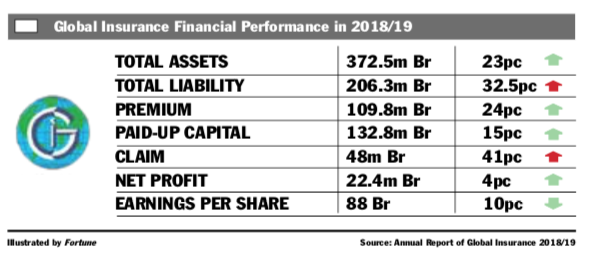
Fortune News | Mar 28,2020
May 9 , 2020
By Eden Sahle
Imagine how much would have changed if countries around the world had agreed that the Novel Coronavirus (COVID-19) pandemic was just China’s problem. It is not much of an exaggeration to assume that the lives of hundreds of thousands more would have been lost by now.
We have seen before how trouble in one place of the world does not remain isolated. COVID-19 is our timely reminder.
It has been a while now since we started living in a world where most countries are not sympathetic to the troubles of others unless that problem knocks on their own borders. Civil wars, famines and poverty have been raging in parts of the world periodically, and leaders of the world have been sitting idly by in the belief that such crises do not concern them.
Countries around the world have pretended that it is not their problem that people have died trying to cross the Mediterranean and as corrupt and brutal leaders have been allowed to kill and rob with impunity.
One crucial factor in all of these problems is the neglect by those in power, by regional and international bodies to work together, raise the necessary funding and draw up action plans to address the political and economic malaise across the world.
This has not been happening even as it has become painfully clear that few problems remain contained within just one country. The extent to which the world is now interconnected is startling, and yet we have failed to recognise how every problem reverberates across borders.
The good news is that crises have in many instances been followed by a recognition of shortcomings and an increased interest in working together to address challenges. COVID-19 did manage to ignite a sense of respect for human dignity and science. At the very least, it has shown us how weak our health systems are and how critical health professionals are to any modern civilisation.
The trauma of the lost lives and the pandemic will remain with us for life, but we can also remember and honour those who left us by establishing a new and fair world order.
The bad news is that unless there is a great loss of human life, we rarely are able to take any lessons for the future. We seem to only be able to recognise the glaring shortcomings at the heart of our problems when we are confronted with the grim consequences.
COVID-19 should be a reminder that it is a lack of willingness to work together that has led to this disaster. Poor countries need developed nations to share their knowledge and resources so that economic inequality, rampant corruption, incapacitated social capital and authoritarian leanings could be addressed.
The world should be awakened to the reality that the problems of the world are many and undeniably stark. The prosperous and the poor are as far apart as the sky and earth, but whether we like it or not, we are all intertwined. The pandemic is just another reminder that countries cannot continue on their own. No country is a metaphorical island here in this world.
Addressing lasting political and economic shortcomings should be the quest of every country. The world needs a universal goal to aspire to, one that everyone agrees on and is geared specifically toward addressing inequality across the world. This will evidently not happen right away, but we should waste no time working towards that goal.
The international institutions and the global world order we have in our hands now is dysfunctional and cannot be trusted to address some of the biggest challenges of many countries, from epidemics and conflict to natural disasters. It is about time that it is overhauled.
PUBLISHED ON
May 09,2020 [ VOL
21 , NO
1045]

Fortune News | Mar 28,2020

My Opinion | Jul 20,2024

Viewpoints | Mar 04,2023

Commentaries | Mar 01,2024

Viewpoints | Aug 19,2023

My Opinion | Sep 30,2023

Viewpoints | Oct 28,2023

My Opinion | Mar 04,2023

Commentaries | Sep 13,2025

Commentaries | Mar 18,2023

Photo Gallery | 176214 Views | May 06,2019

Photo Gallery | 166429 Views | Apr 26,2019

Photo Gallery | 156900 Views | Oct 06,2021

My Opinion | 136888 Views | Aug 14,2021

Dec 22 , 2024 . By TIZITA SHEWAFERAW
Charged with transforming colossal state-owned enterprises into modern and competitiv...

Aug 18 , 2024 . By AKSAH ITALO
Although predictable Yonas Zerihun's job in the ride-hailing service is not immune to...

Jul 28 , 2024 . By TIZITA SHEWAFERAW
Unhabitual, perhaps too many, Samuel Gebreyohannes, 38, used to occasionally enjoy a couple of beers at breakfast. However, he recently swit...

Jul 13 , 2024 . By AKSAH ITALO
Investors who rely on tractors, trucks, and field vehicles for commuting, transporting commodities, and f...

Oct 18 , 2025
The political establishment, notably the ruling party and its top brass, has become p...

Oct 11 , 2025
Ladislas Farago, a roving Associated Press (AP) correspondent, arrived in Ethiopia in...

Oct 4 , 2025
Eyob Tekalegn (PhD) had been in the Governor's chair for only weeks when, on Septembe...

Sep 27 , 2025
Four years into an experiment with “shock therapy” in education, the national moo...

Oct 18 , 2025 . By NAHOM AYELE
In a sweeping reform that upends nearly a decade of uniform health insurance contribu...

A bill that could transform the nutritional state sits in a limbo, even as the countr...

Oct 18 , 2025 . By SURAFEL MULUGETA
A long-planned directive to curb carbon emissions from fossil-fuel-powered vehicles h...

Oct 18 , 2025 . By BEZAWIT HULUAGER
Transaction advisors working with companies that hold over a quarter of a billion Bir...